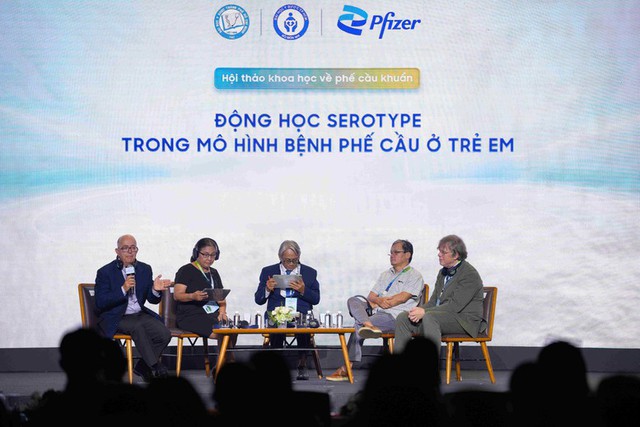Raising awareness and protecting children from pneumococcal diseases
VGP - Experts affirm that proactive prevention is a strategic solution aligned with the health sector’s orientation of shifting from “treatment to prevention.”

Domestic and foreign experts at the specialized scientific symposia on pneumococcus under the theme "Serotype Dynamics in Pediatric Pneumococcal Disease"
Pfizer Viet Nam, in collaboration with the Department of Pediatrics (University of Medicine and Pharmacy at Ho Chi Minh City) and the Centre for Health Professionals Training (University of Medicine and Pharmacy at Ho Chi Minh City), successfully organized a series of specialized scientific symposia on pneumococcus under the theme "Serotype Dynamics in Pediatric Pneumococcal Disease" in Ho Chi Minh City on November 11 and in Ha Noi on November 13.
The events brought together more than 1,000 domestic healthcare experts and professionals, serving as scientific forums to update the latest epidemiological data on pneumococcal disease—particularly in young children, the group most at risk from highly virulent bacterial strains.
The symposia also provided a platform for Vietnamese and international experts to share experiences in implementing early and broad prevention strategies aimed at effectively controlling high-risk pneumococcal serotypes. In addition, the discussions highlighted the global contributions and legacy of pneumococcal conjugate vaccines in preventing pneumococcal disease in children.
Young children most vulnerable to virulent pneumococcal serotypes
According to the World Health Organization (WHO), approximately 1.6 million people die each year from diseases caused by pneumococcus, with about 1 million of these deaths occurring in children under the age of five.
Pneumococcus is responsible for serious illnesses such as pneumonia and otitis media, and especially invasive diseases that enter the bloodstream or cerebrospinal fluid, such as meningitis and bacteremia.
Viet Nam is among the 15 countries with the highest prevalence of childhood pneumonia—a leading cause of morbidity and mortality among children under five.
Studies also show that young children are at high risk of infection by highly virulent pneumococcal serotypes. Invasive diseases such as meningitis and bacteremia can cause severe neurological, cardiac, and renal sequelae, with approximately 25 to 50 percent of survivors facing long-term neurological complications.
Dr. Truong Huu Khanh, former Head of the Department of Infection and Neurology at Children's Hospital 1 in Ho Chi Minh City and Vice President of the Infectious Diseases Association, emphasized: "Young children are the most vulnerable group to pneumococcus, particularly when infected with highly virulent serotypes. The invasiveness and virulence vary across pneumococcal serotypes, necessitating prevention strategies that broadly cover high-risk serotypes."
Effective disease-prevention measure
Experts note that more than 100 pneumococcal serotypes have been identified, with 23 accounting for approximately 80 to 90 percent of invasive pneumococcal disease cases in children. The continuous circulation and evolution of these serotypes underscore the urgent need to update prevention strategies based on current epidemiological data.
They recommend that prevention strategies be comprehensive, coordinated, and sustainable. These include improving personal and environmental hygiene, raising community awareness about pneumococcal disease and its early warning signs, and promoting early proactive prevention.
According to WHO, vaccination is one of the most effective measures to reduce the burden of infectious diseases, especially amid growing global antibiotic resistance. Vaccination not only protects individuals but also reduces bacterial carriage at the community level, creating an "immunity shield" that protects even those who are not vaccinated.
Professor Javier Díez Domingo from the Vaccine Research Department, FISABIO Public Health Foundation, Valencia, Spain, stated: "The continuous circulation and evolution of pneumococcal serotypes create an urgent need for close monitoring to better control the disease. The application of advanced preventive solutions with broad high-risk serotype coverage is essential to close current immunity gaps. This scientific approach is critical for minimizing the risk of morbidity and mortality from invasive pneumococcal disease, while contributing to the proactive and sustainable protection of child health."
To date, the Ministry of Health has licensed five pneumococcal vaccines. Each vaccine differs in development technology, serotype coverage, clinical research pathways, and post-introduction data. Four of these vaccines are produced using conjugate technology, which helps develop immune memory and reduce pneumococcal carriage in the nasopharynx, contributing to long-lasting protection and stronger herd immunity.
Speaking at the symposia, Dr. Mark Fletcher, Senior Director of Pfizer Vaccines Research and Development, Medical Affairs, noted: "The legacy of pneumococcal conjugate vaccines represents a global medical achievement, having been widely implemented in more than 160 countries and demonstrating a significant impact in reducing disease burden and mortality among children. We believe this provides a solid foundation to further expand protective coverage, enhance preventive effectiveness, and address complex future health challenges such as antimicrobial resistance."
The symposia are part of Pfizer Viet Nam's ongoing efforts to support the healthcare sector through awareness-raising initiatives and the sharing of international best practices, contributing to the protection of public health—especially safeguarding children, who represent the nation's future./.
